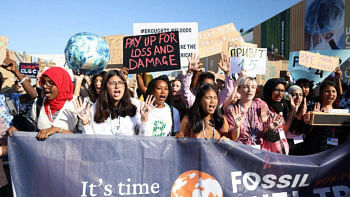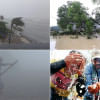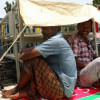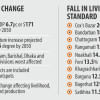Making the climate change battle inclusive

Climate change is a global crisis. Raising awareness is not enough; we must provide people with the information and tools to combat the effects of climate change. It is fundamental to engage in activism, campaigns, and advocacy and organise dialogues and conferences to discuss how to reduce the effects of climate change. To be effective and truly transformative, respect for and promotion of gender equality, women's rights, marginalised groups, youth leadership and indigenous community must be central to climate action.
Participation in climate and environmental decision-making is a human right and the equal participation of people belonging to all genders generates more effective and sustainable outcomes. Women are underrepresented when it comes to decision-making regarding climate negotiations. At COP 28, there were only 34 percent of women across all national delegations, compared to 31 percent at COP 14 in 2008. Only two percent of the delegations at COP 28 had an equal number of men and women, while 79 percent had more men than women, representing the ongoing disparity in women's participation in climate negotiations.
Besides, there is still the Sustainable Development Goals financing gap estimated at $4 trillion annually for developing countries, with the Global South being affected disproportionately. Loss and damage are closely related to the concept of "just transition" and equity because the world's most climate-vulnerable countries are often the lowest contributors to climate change, yet heavily affected by it. With COP 29 ahead, there is an urgent need to agree on a new climate finance goal of $5 trillion annually to address climate loss and damage. This climate finance should be channelled through well-planned and targeted actions with transparency and accountability. Global leaders should come forward and commit to addressing issues needed to combat climate change and to support the countries that are more vulnerable and prone to natural disasters occurring as a result of climate change.
Meanwhile, fossil fuel burning must be prohibited to avoid the worst impacts of the climate crisis. Over $677 billion in subsidies is being poured into fossil fuel and industrial agriculture sectors annually, fuelling greenhouse gas emissions. Developed countries are the primary beneficiaries of these subsidies, which are contributing to global temperature rise and biodiversity loss. The energy demand has increased worldwide due to economic advancement and development and a major part of the energy demand is met by fossil fuels. Although Bangladesh has remained resilient, natural resources are depleting rapidly and negatively impacting the environment which is accelerating climate change, therefore making it crucial to reduce the dependency on fossil fuels and slow down climate change to build a habitable world for future generations.
Moreover, in Bangladesh, 40 percent of the population lacks access to safe water, highlighting the urgent need for action. It is crucial to acknowledge how vulnerable populations, particularly women, are disproportionately affected by water-related crises. With limited access to resources and decision-making power, women have to encounter challenges that are different in nature from those faced by men. It is reported that women starve during a disaster when there is a crisis and food shortage to feed their children and other family members. Women are exposed to new forms of risks when they have to move to flood or cyclone shelters. Displaced women and girls who move to temporary shelters or embankments are in even higher risk categories with reports of child marriage or trafficking. Women's empowerment in climate action is crucial for creating effective and sustainable solutions. Involving women in developing funding criteria and resource allocation helps prioritise projects that directly benefit communities, and enhance resilience and adaptive capacity. When women and minorities participate actively in shaping technologies and solutions, we foster creativity and innovation that are essential for tackling climate challenges. This needs to happen at global climate discussions and at national levels.
The other aspect that is necessary to incorporate is the unique perspectives and experiences of the youth which can lead to innovative approaches for addressing the diverse impacts of climate change on different communities. Equity and youth leadership are important for the future and the government should plan to invest in these areas. Similarly, Indigenous communities deeply connected to the land suffer disproportionate impacts, highlighting the importance of Indigenous knowledge and rights in conservation efforts. People with disabilities also face unique challenges in climate-related disasters, necessitating inclusive emergency planning and infrastructure to address accessibility barriers and health conditions worsened by environmental changes. Empowering marginalised groups enables their meaningful participation in decision-making processes and ensures equitable access to resources and opportunities.
Bangladesh has been resilient in the face of formidable climate challenges. There is no question that a collaborative spirit unites Bangladesh to protect and strengthen communities against climate adversities. However, the inclusion and integration of different perspectives into national policies and sustainable development plans must be focused on, in order to guarantee that the needs and knowledge of the underrepresented are recognised and addressed, leading to more equitable and effective climate interventions.
Nationally Determined Contributions (NDC) embody governments' commitments to reduce greenhouse gas emissions and adapt to climate change. If designed effectively, NDCs, alongside the voluntary National Adaptation Plan (NAP), can provide an effective framework to guide gender-responsive national climate action and include it in Disaster Risk Reduction (DRR) and disaster response as well. Unfortunately, when we dived deeper, we found that most climate strategies across South Asia remain gender-blind, pointing to the stark reality that as climate disasters cause devastation across the region, women, girls, youth and other marginalised groups continue to be overlooked, excluded and left behind in government responses.
We need to ensure an intersectional approach to climate action that incorporates the needs and priorities of women and girls, youth, marginalised groups, and Indigenous communities. Existing and new policies should reflect and address issues of climate justice in terms of budget and allocation that is gender-sensitive and gender-responsive. Incorporating gender considerations and insights of youth, Indigenous and marginalised groups into new climate policies and frameworks, will pave the way to foster synergies between gender equality, climate action, and sustainable development, leading to more cohesive and effective policy responses.
Farah Kabir is the country director of ActionAid Bangladesh.
Views expressed in this article are the author's own.
Follow The Daily Star Opinion on Facebook for the latest opinions, commentaries and analyses by experts and professionals. To contribute your article or letter to The Daily Star Opinion, see our guidelines for submission.

 For all latest news, follow The Daily Star's Google News channel.
For all latest news, follow The Daily Star's Google News channel. 










Comments